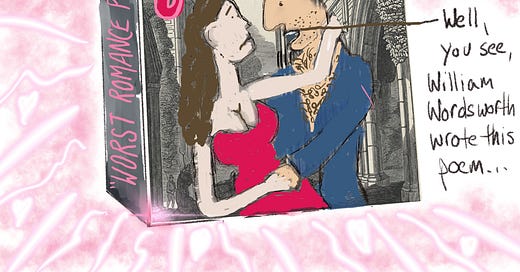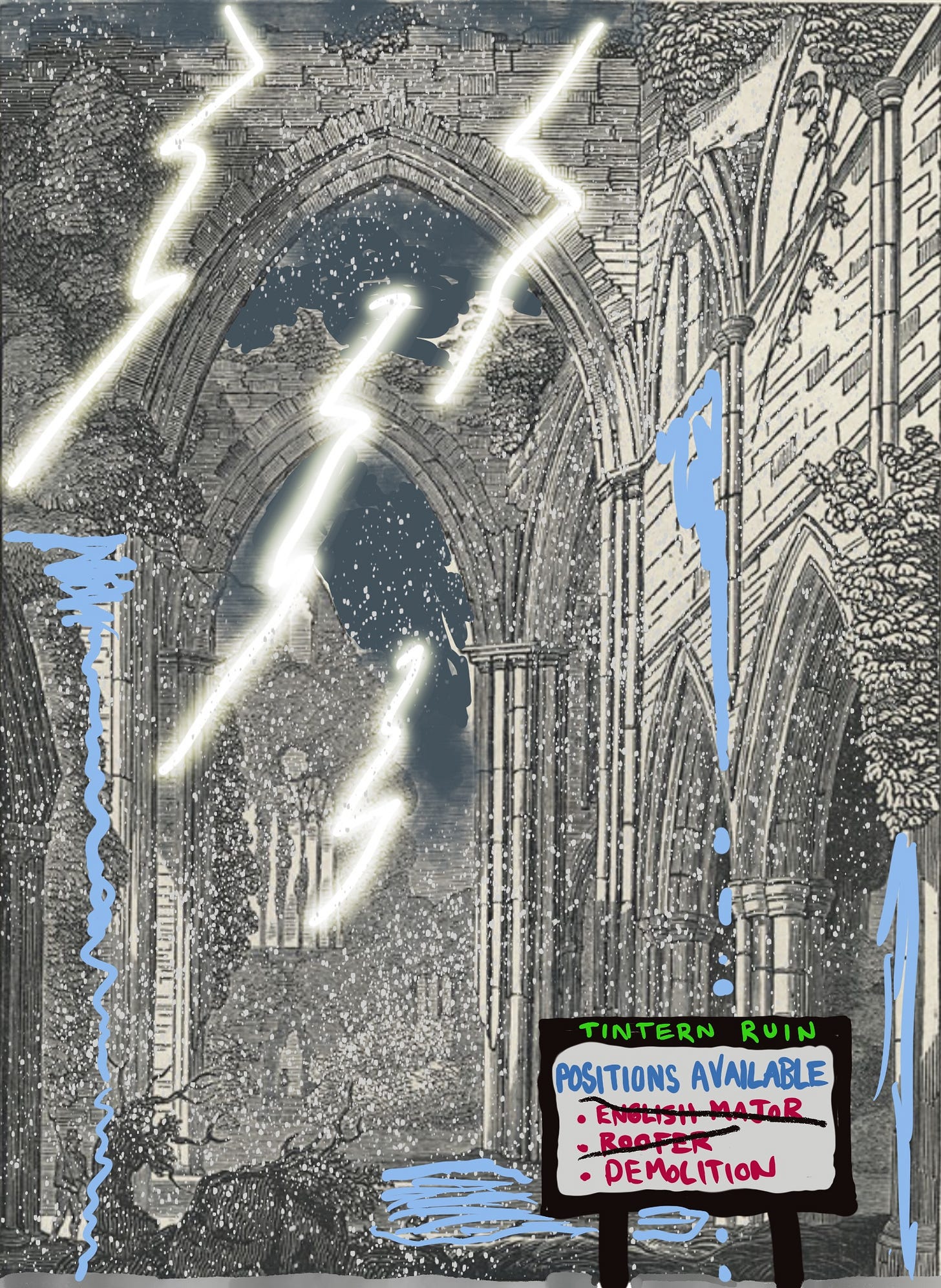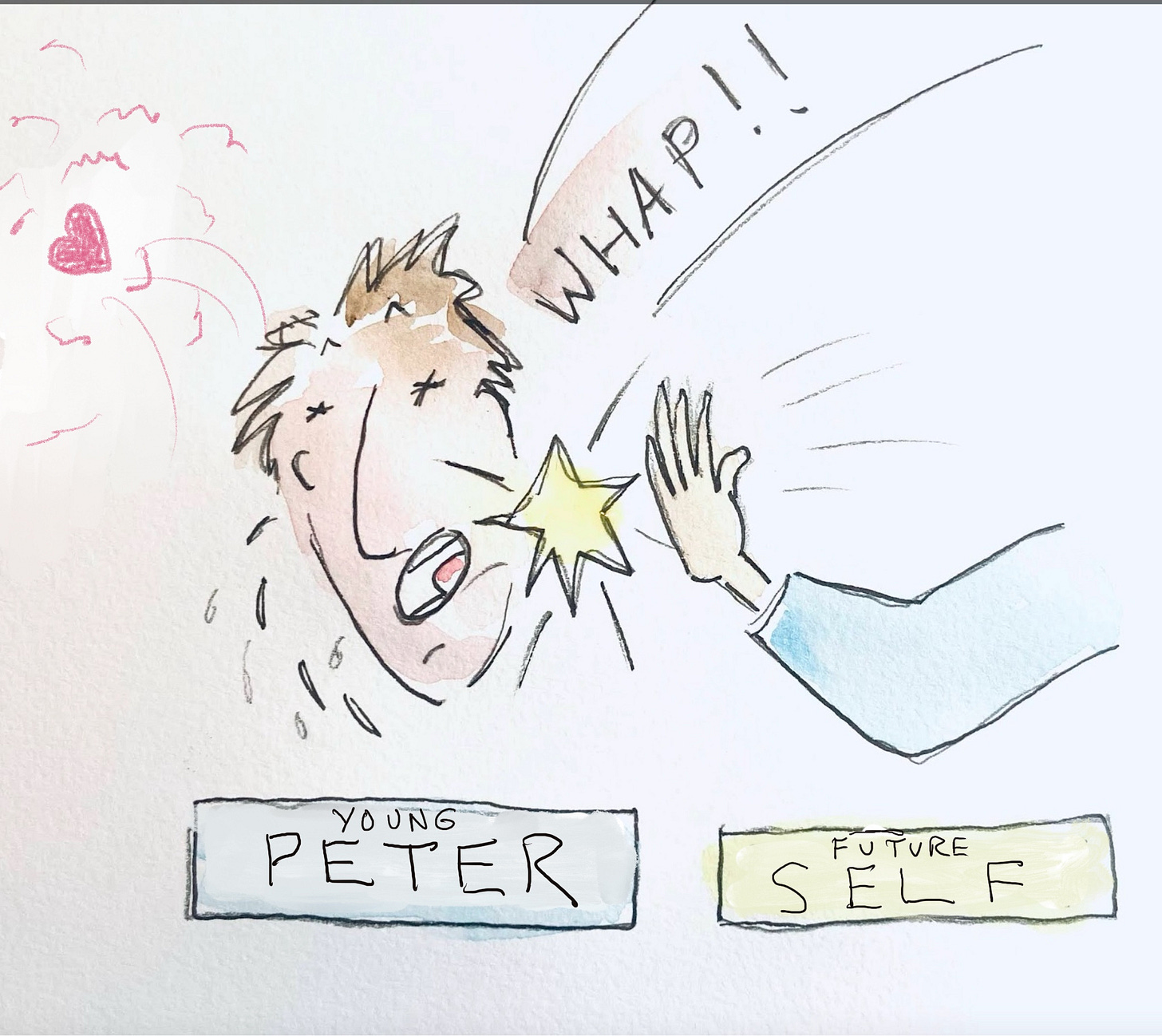Excerpt #55: Kiss the Girl (or Not)
Spoiler alert: I didn't. But there were other compensations from my visit to the site of the best poem written in the English language. WRITTEN & ILLUSTRATED by PETER MOORE
As longtime readers of this ‘stack know, I often interrupt my flow of gibes and satire with excerpts from my graphic-memoir-in-progress: A Portrait of the Artist as a Young Nincompoop. The first excerpt is here. The most recent one is here, wherein I described a visit a ruined church in the English midlands, which inspired William Wordsworth to write my favorite poem in the English language. And I, in turn, was inspired to fritter away a very romantic moment. This is all part of further adventures of young Peter, who left language school in Paris for no apparent reason, and continued his revels and wanderings in England. As the action resumes, I have left the southern English hamlet of Amberley in search of love, and literary analysis. True to form, I was more successful at the latter.
WILLIAM WORDSWORTH PACKED HIS MAGNUM OPUS TINTERN ABBEY with deeply remembered emotion and outdoorsy imagery, which struck a chord on my own trembling strings. I too was a wanderer, and I didn’t even have a sister like Dorothy Wordsworth to console me. But, for the day, I did have Aurora. In the bodice-ripper version of my life story, I’d have her tucked under my left arm and a scroll bearing “Tintern Abbey” popping the musculature on my right. I already had long, curling hair, which was a start.
“Five years have passed,” the poem begins, “five summers with the length of five long winters! And again I hear these waters, rolling from their mountain-springs with a soft inland murmur.”
Wordsworth was burnishing the brilliant past by shining the light of a troubled present upon it. He complains of his “lonely rooms,” and the “din of towns and cities.” That din probably included the buzzing of Charles Mogg and the Alfoxden busybodies—enough to make anybody feel lonely.
Simply harkening back to the church ruins, he’s able to tap into a well of “sensations sweet,” which help him access the “best portion of a good man's life, his little, nameless, unremembered, acts of kindness and of love.”
Is there a better protocol for a worthwhile life?
The tone of “Tintern Abbey” is quiet, appreciative, thoughtful, soul-feeding. He relishes the retreat into something deeper and longer lasting. Which is ironic, because he’s writing about a roofless ruin that lets in more rain than worshippers.
The roofing problem was the fault of King Henry the VIII, as so many problems are. When VIII flipped denominations from Catholicism to the Church of England, in 1537, priests were on the outs. Henry closed the abbeys and confiscated their furnishings through a bureaucratic power play called the “Dissolution of Monasteries.” Nine hundred religious buildings were shut down, their monks and friars banished, and their assets sold. If Hamlet had told Ophelia “get thee to a nunnery” in this dark era, she might have replied, “Like, where?”
Lord of Chepstow, Henry Somerset, 2nd Earl of Worcester, was deputized to cash in Tintern Abbey, and he began by selling off the “tin” part. Removing the roof will kick-start a romantic ruin like nobody’s business.
And so the picturesque decay began. The church was ignored for a couple of hundred years, until rural tourism went on-trend in England, in response to the Enlightenment. It’s exhausting to be enlightened, hence the invention of vacation. The poet Thomas Gray helped out with that, ranging around Wales, Scotland, and England and working himself up into elegiac moods, what with all of those romantic ruins falling into their ivy beds.
It’s exhausting to be enlightened, hence the invention of vacation.
Wordsworth followed in his footsteps, also sighing.
As did I, another two hundred years along, transported by the poetry, the beautiful grounds, and the lovely young woman who accompanied me there.
Let me set that scene, so you can appreciate the magnitude of my personal failure. It was a fresh fall day. Damp, yes, because this is England, with a resulting level of greenery that overwhelmed the visual cortex. The air smelled of growth and decay—the perfume of mutable lives. And there I was, escorting the most beautiful woman I’d ever seen (at least, that week) into a soul-melding landscape.
Carpe dame, you idiot!
We paid our entrance fee at the front gate, and I bought a pamphlet with the full text of Wordsworth’s immortal poem, evoking that landscape, that ruin, and the contours of his romantic heart.
And mine!
Aurora and I strolled, trying to figure out how to walk next to each other. How to talk, and about what. We were fresh and young, in high contrast to a falling-down abbey.
Oh no! Signs of rain!
A few drops came, then a few more. We scampered into a graveyard on a high ground above the abbey, and I read the poem aloud to Aurora. Then, as the shower intensified, we retreated into a half-century old crypt enclosure. We were rain dappled, a little cold, and wedged into close proximity by the surrounding granite.
It was the moment to kiss her.
“I am far from being in control of my emotional expressions,” I wrote in my journal the next night. “My mind is at war with a body that refuses to perform the actions called for. On November fifteenth I spent a charmed day with A. I felt that we grew closer as every minute passed. I wanted to touch her, feel her bodily presence, tell with my arms and hands and lips what my mind clearly perceived: Here was a person deserving of such affection and attention. Countless situations arose, and I bypassed them all. My arms folded. My hands sought my pockets. I turned my eyes from hers. Purged the magnetism of the moment.”
I want to smack myself.
“The situation grew ripe so many times; on the path up to our collapsed church (she extended a hand, I refused it); underneath the gravestone in our temporary rain shelter; [back in Cardiff] sitting between the three trees while watching the encouraging moon, on the steps of the Wales Museum as she faced me in the darkness between the columns, and countless other times when my soul cried ‘act!’ and my weakness cried ‘be still.’
“The weakness won, and a ripe situation lay broken on the ground. I could not stoop to regain it.”
The kiss not taken.
“Aurora is truly deserving of all the affection I could give her,” I continued, “and I suspect in her the ability to love powerfully, perhaps even me. I am a creature full of intense frustration in my fear to love, and no satisfaction can come until I have resolved this timidity. Again I stand between my potential and my actuality, and that actuality is weak and trifling compared with the potential. No triumphant journal entry here. I record failure, and a devastating one: the failure to express my emotions. I am as caged as my emotions.”
There was a break in the writing on the page, as I thought all this over.
Then I wrote: “But perhaps they are caged to my advantage?”
By the next day, I was already flogging myself over lack of productivity, noting that travel was “preventing me from accomplishing anything right now.” I wasn’t reading. I wasn’t writing. I wasn’t kissing Aurora under a gravestone, even with the vines of Tintern Abbey showing me how to entwine productively.
Aurora wasn’t the love of my life. She might have been the love of that soul-drenched minute, but that moment passed.
What a waste for a 22-year old to focus on the timeless.
“I’ll tell you,” said [Miss Havisham], in the same hurried passionate whisper, “what real love is. It is blind devotion, unquestioning self-humiliation, utter submission, trust and belief against yourself and against the whole world, giving up your whole heart and soul to the smiter—as I did!” —Charles Dickens, Great Expectations.
I get it: Not everybody has the cash to commit to something as evanescent as an email newsletter.
Also treasured, in my appreciation zone, are those readers who see fit to…
or who hit the little heart button, below, if indeed they “like” what they read here.
And, my path forward is greatly assisted by those of you who share the Road2Elsewhere with friends.
Many thanks to all who contribute, in their own ways!













What a brutally honest young man! At age 22, my own journal entry the morning after a chaste evening of cowardice—with a clearly willing participant in my fully roofed, overheated apartment—reads: "I behaved like a gentleman."
By not having that kiss crash into reality (like a bird into a window) it will forever be the perfect kiss of your dreams. Nothing (bad breath, refusal, scorn…) can ever taint it. 🫦
A 20, I fell for a man (not boy)on a first date (remote beach) because he was NOT all over me. We were together 11 years.